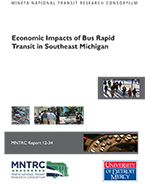Abstract:
In recent years, Bus Rapid Transit (BRT) has generated great interest across the United States. There are more than 20 BRT systems in existence, and more are in the planning stage (including in Detroit). Within the next few years, BRT will be planned and implemented phase by phase in various parts of Southeast Michigan. The purpose of this study is to develop a framework to identify probable economic impacts of BRT in Southeast Michigan.
Taxable real estate values, injury and fatal crash data, and selected demographics of BRT users, including employment sector, age group, median income, and daily vehicle miles traveled were reviewed to identify Southeast Michigan’s current and future trends.
The project team also performed shift-share analysis using Cleveland and Kansas City data to determine the BRT-advantaged age group. The authors recommended a number of action items to attract choice riders and gratify riders who must rely on BRT, such as tax incentives, branding, guaranteed levels of service, etc. Based on the literature review and analysis of existing BRT-related data by the project team, BRT-advantaged job sectors and age groups within the Southeast Michigan region were identified. BRT will be implemented in phases. This will affect the amount, type, and timing of investments in BRT. Considering this uncertainty, the potential economic impacts as a function of type and amount of investment were discussed. It is to be noted that in order to achieve the projected results, the BRT system must be planned, designed, and implemented based on the unique attributes of the Southeast Michigan region rather than by copying a system that has achieved success in another region.
Authors:
UTPAL DUTTA, PH.D.
Utpal Dutta is a professor of Civil, Architectural & Environmental, and Transportation Engineering at the University of Detroit Mercy. Dr. Dutta has been involved in transit-related research for more than twenty years. He is a member of Transportation Research Board, Institute of Transportation Engineers, ASCE, and ASEE.
JEFF HENZE
Jeff Henze is a Masters candidate in the Community Development program at the University of Detroit Mercy, pursuing a specialization in Economic Development. He holds an undergraduate degree in Political Science-Public Policy from Western Michigan University. His research interests include the role of regional cooperation in community and economic development.


